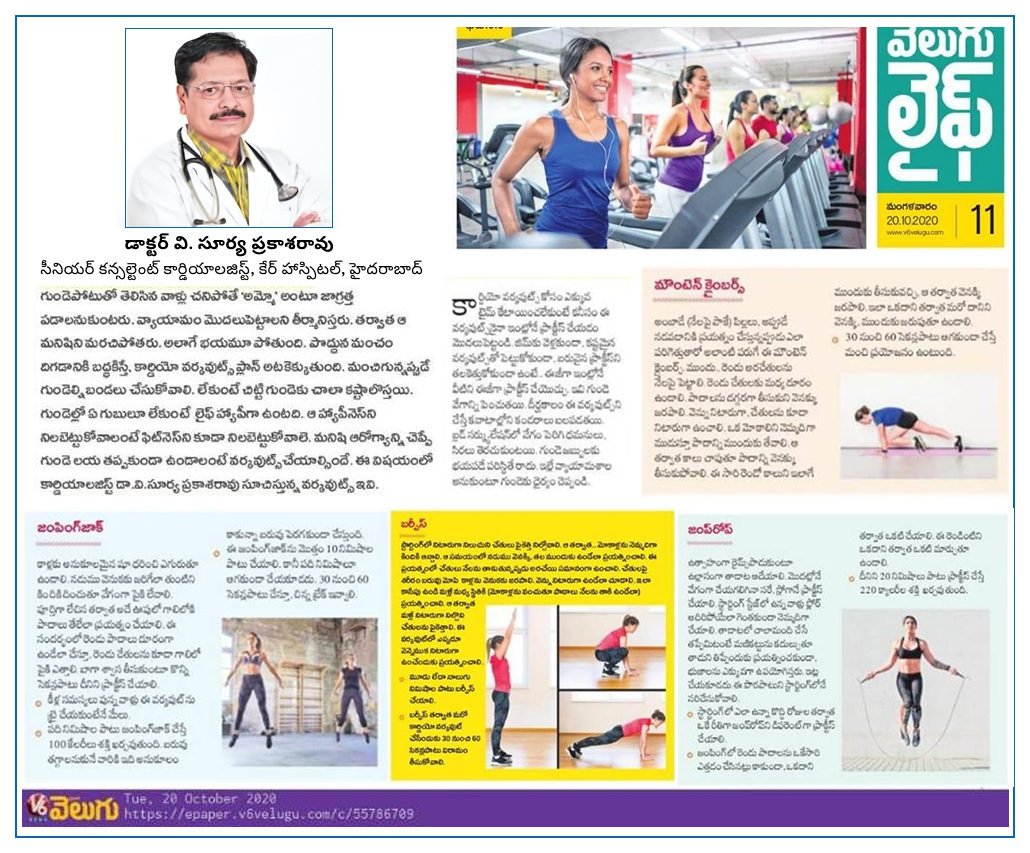
Learn effective tips to improve your heart health naturally with exercises, cardio routines, and guidance from Dr. Surya Prakasa Rao Vithala, senior interventional cardiologist at CARE Hospitals, Hyderabad.
Why Heart Strength Matters
Weak heart muscles can lead to fatigue, breathlessness, and over time, increase the risk of heart failure or cardiac arrest. A strong heart improves blood circulation, oxygen flow, and lowers the risk of hypertension and heart disease.
Top Exercises to Strengthen the Heart
- Cardio Workouts (Aerobic Exercises): Activities like brisk walking, jogging, cycling, swimming, and treadmill exercises are powerful tools to boost heart function. These improve oxygen use, lower cholesterol, and help maintain a healthy weight.
Frequency: At least 30 minutes a day, 5 days a week
Benefits: Improved stamina, lower blood pressure, better circulation - Jump Rope (Skipping):
Jumping rope is a full-body aerobic workout that significantly raises the heart rate, promoting cardiovascular endurance. Jumping Jacks A simple but effective exercise for warming up the heart. Just 50–60 repetitions daily can enhance blood flow and metabolism. - Jumping Jacks:
A simple but effective exercise for warming up the heart. Just 50–60 repetitions daily can enhance blood flow and metabolism.
Breathing Exercises (Pranayama)
Deep breathing exercises, such as diaphragmatic breathing, help reduce stress and oxygen demand on the heart. Controlled breathing balances the autonomic nervous system and promotes relaxation.
Strength & Core Exercises
- Burpees
This high-intensity workout combines squats, jumps, and planks into a full-body heart-pumping activity. It helps burn fat, improve muscle tone, and strengthen cardiovascular response. - Mountain Climbers
A core strengthening exercise that also benefits the cardiovascular system. It promotes agility, coordination, and heart-lung efficiency.
Diet and Lifestyle Tips
In addition to regular workouts, keep your heart strong by:
- In addition to regular workouts, keep your heart strong by:
- Eating high-fiber, low-fat meals
- Avoiding excessive salt and sugar
- Managing cholesterol and BP through check-ups
- Getting 7–8 hours of sleep per night
- Avoiding smoking and alcohol
Medical Tip from Dr. Surya Prakasa Rao Vithala
“Heart strength doesn’t only depend on medication. A combination of structured physical activity, diet, and stress management plays a key role in keeping the heart youthful and functional.”
Conclusion
Improving your heart strength is not just for those already diagnosed with heart issues—it’s essential for everyone. The earlier you start, the better your long-term cardiac health will be. Start small, be consistent, and always consult a cardiologist for personalized guidance.
